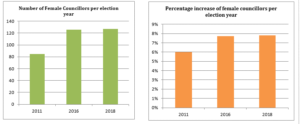AN ANALYSIS OF ZAMBIA’S SIXTEEN COUNCILLOR BY-ELECTIONS IN 2018
Compiled by Zambia National Women’s Lobby
1. INTRODUCTION
The by-elections in the 16 wards were as a result of convictions, resignations and deaths of incumbent councilors. In view of the above, the Electoral Commission of Zambia (ECZ) set Tuesday 24th April, 2018 as the day for the by-elections in the following wards: Luapula, Kansuswa, Chiweza, Chiwuyu, Ntumbachushi, Munwa, Nampundwe, Mikunku, Kalebe, Kakoma, Kanongo, Mushima, Kalilele, Mudyanyama, Mwanza East and Lealui Lower.
2. PRE- ELECTION
The campaign period for these elections commenced on Tuesday 27th March, 2018 after 15:00 hours and ended at 18:00 hours on Monday, 23rd April, 2018. The ECZ received complaints from stakeholders on 18th April, 2018 of electoral violence in Mwanza East Ward of Monze District however; the commission in conjunction with the police made an assessment of the environment and deemed it conducive for the by-elections. The by-elections thereafter took place on 24th April, 2018 as scheduled.
3. NOMINATION PROCESS
The total percentage of female candidates who participated in the by-election is 7% compared to 93% male. The following number of candidates validly filed in their nomination on 27th March 2018 and participated in the 16 councillor by-elections which took place on 24th April, 2018:
Table 1: Number of candidates who participated in the 16 councilor by-elections disaggregated by sex
| POSITION | FEMALE | PERCENT | MALE | PERCENT | TOTAL |
| Councillor | 4 | 7% | 53 | 93% | 57 |
4. RESULTS
Out of the 57 candidates who participated in the 16 councillor by-elections only 1[1] out of 4 female candidates won the by- elections while 15 out of 53 males won the by-elections as indicated below:
Table 2: Number of candidates who won the elections dis-aggregated by sex
| POSITION | FEMALE | MALE | TOTAL |
| Councillor | 1 | 15 | 16 |
Following the just ended 16 councillor by-elections, the total number of female councilors has increased from 126 to 127 representing 7.8% councilors seats held by women while seats held by men have increased from 1,499 to 1,514 representing 93% in the whole country. However, the performance of women at Council level has improved compared to the 2011 General Elections when only 85 women won (5.9%). The graphs below indicate the increase by election year:

5. CONCLUSION
While the ZNWL applauds political parties that considered adopting female candidates on their party tickets, the participation of women in the by-elections was not very impressive as only 4 women participated and out of the 4, only 1 woman won. This indicates that the country is still lagging behind in entrusting women with leadership positions. Therefore, radical measures have to be put in place to ensure that the country’s leadership truly reflects the population it represents. To let the country change its attitude towards women’s representation on its own is not an option as this can take several years to achieve.
[1] Ms. Elizabeth Sachiwano from UPND Party Kalilele Ward: Mushindamo District, North Western Province





